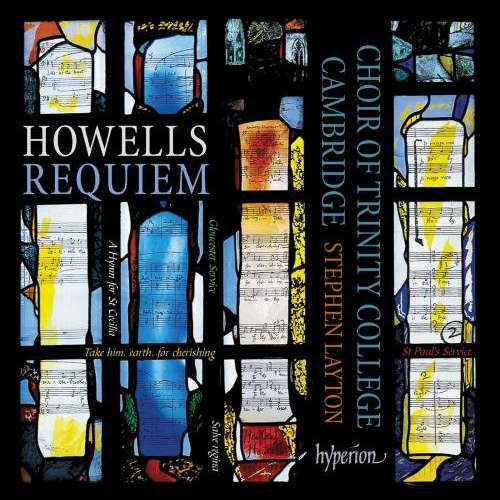- Clementi
- Dashbaldangiin Purevsuren
- Edward Heath
- harmonia mundi sas
- Kenneth Bowen
- Alfven
- Igor Yuzefovich
- Nina Warren
A Booming Success
RON BIERMAN reports on the San Diego Symphony Orchestra, live at its upgraded outdoor concert hall
What was a makes-you-jump BOOM!! doing in Gershwin's Rhapsody in Blue? Had someone mistakenly lit an 1812 Overture cannon? Were we under attack?! Oh wait! It was just a bass drum resonating through the San Diego Symphony's spectacular new state-of-the-art sound system at the Rady Shell. And so, Rafael Payare's initial in-person public concert during his first full season as music director, though a year late because of COVID-19, was a booming success.
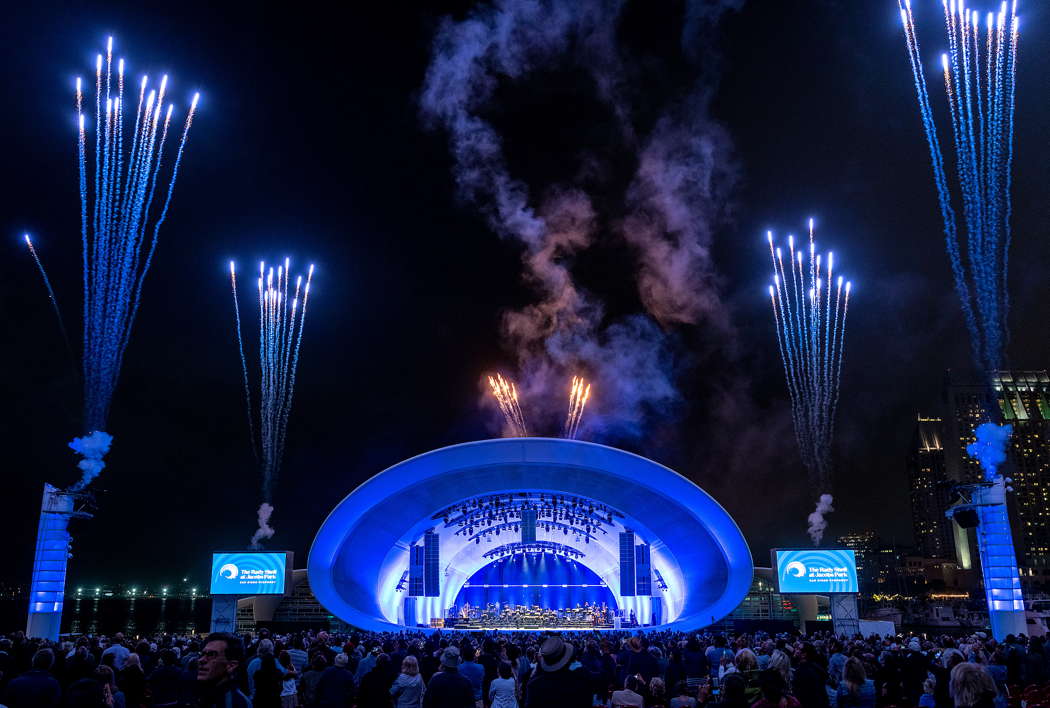
A scene from the reviewed San Diego Symphony concert. Photo © 2021 Gary Payne
Sound was only one of the improvements made during the 85 million dollar upgrade of the Symphony's outdoor-concert amphitheater. Others include more food choices, improved multi-media capabilities, capacity expansion, improved backstage facilities for headliners - the list goes on.
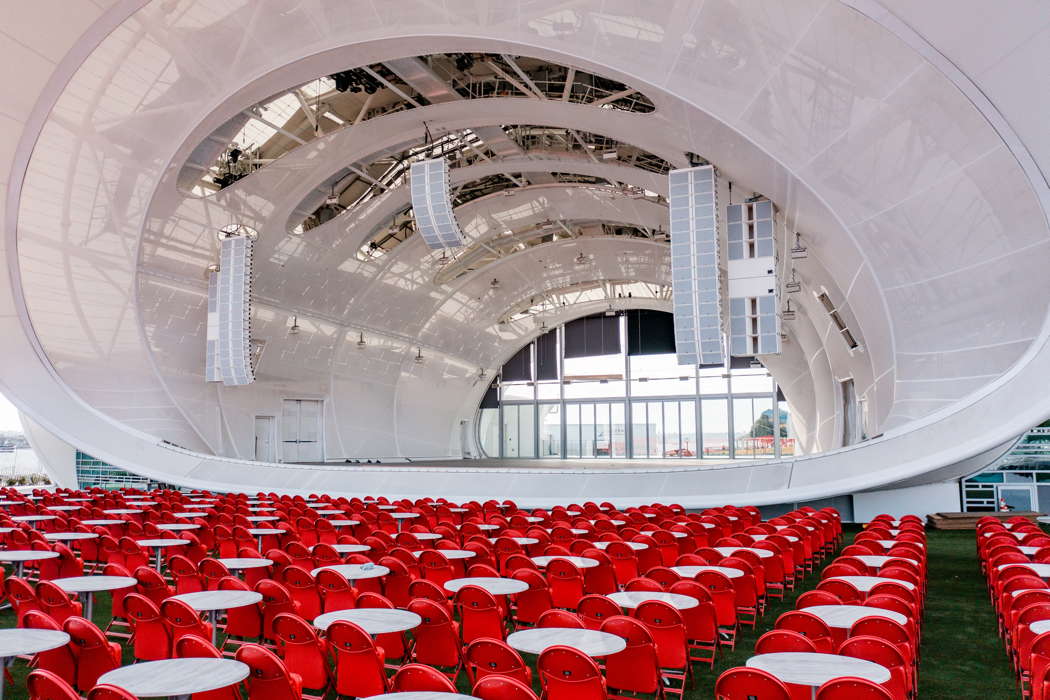
San Diego's Rady Shell in Spring 2021
A crowd of 3,500 attended the Shell's opening concert, and the program and performers were up to the importance and excitement of the moment. The latter was demonstrated with a roar as a backlit curtain displayed a giant silhouette of the Symphony's slim, bushy-haired conductor, and the applause grew as the curtain rose for him and the orchestra.
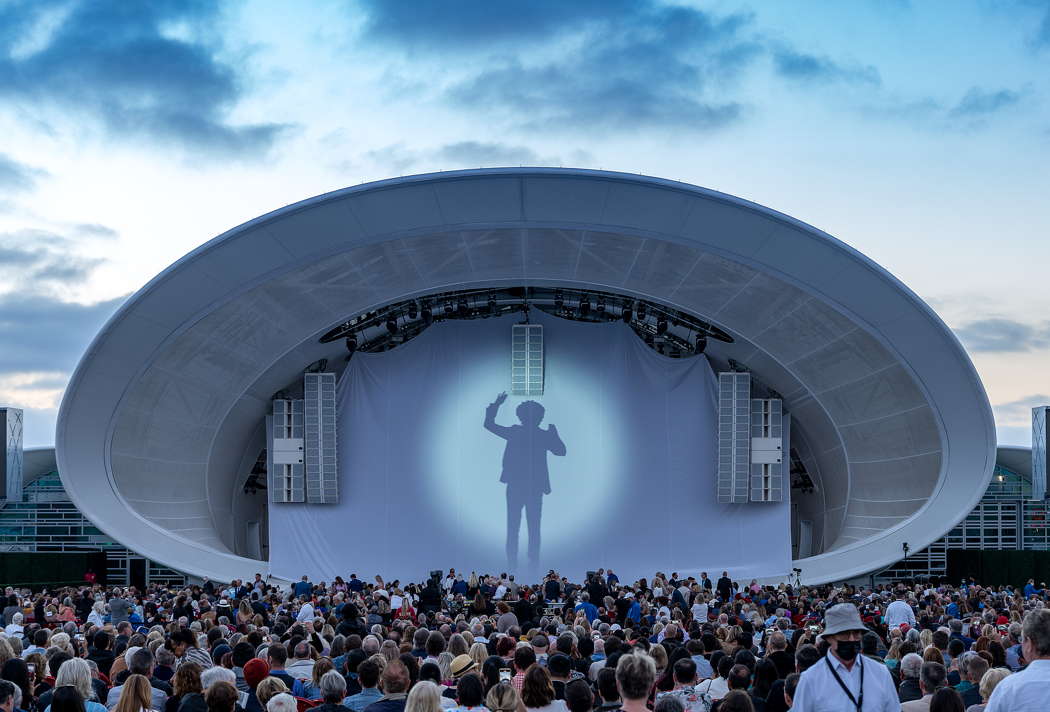
Rafael Payare in silhouette at the San Diego Symphony concert. Photo © 2021 Gary Payne
The opening piece, commissioned for the occasion, was Mason Bates' electronically enhanced Soundcheck in C Major, a modern version of an anticipation-building overture and a perfect demonstration of the Rady Shell's acoustics. The composer was at the necessary laptop to trigger sometimes roaring cacophonous sounds, all the more reminiscent of a metal rock-band concert thanks to quotations from the music of Led Zeppelin and The Who.
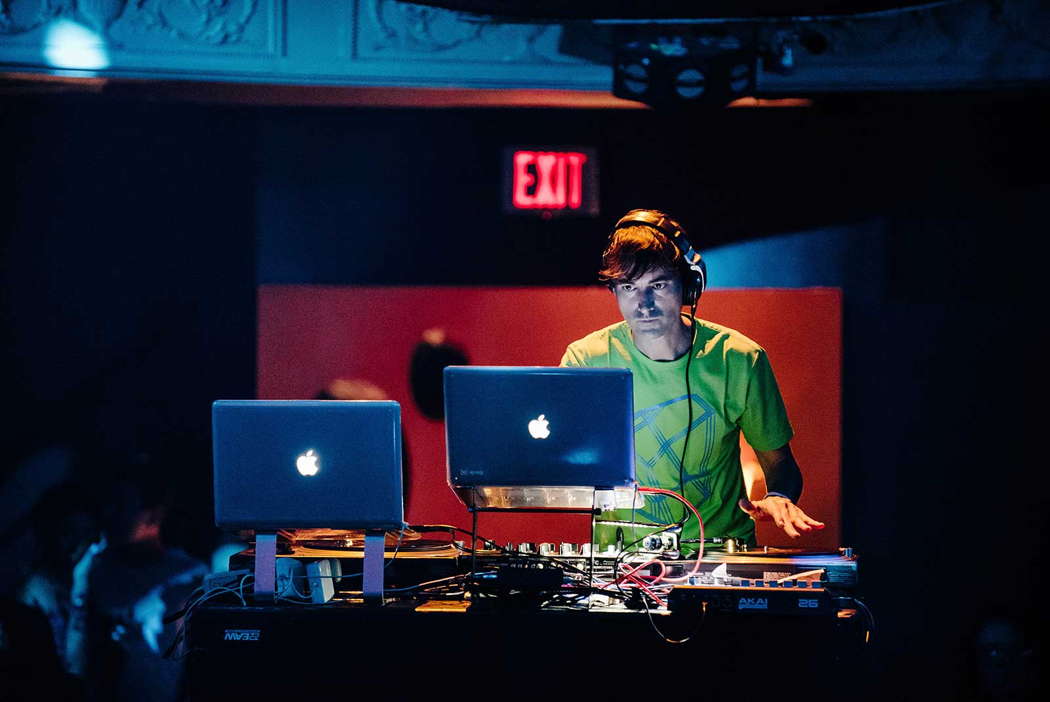
Mason Bates DJing at Mercury Soul in San Francisco. Photo © 2015 CM Howard Photography
Audience attention ensured, the program proceeded to luxuriate in Romantic-era melody. Saint-Saëns' first cello concerto led the way with Maestro Payare at the podium and his wife Alicia Weilerstein as the soloist.
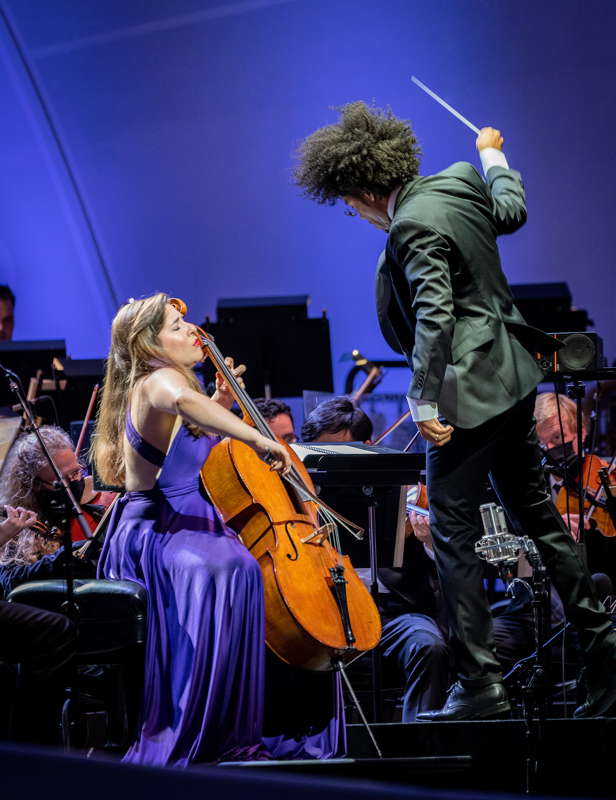
Alicia Weilerstein and Rafael Payare performing Saint-Saëns with the San Diego Symphony. Photo © 2021 Gary Payne
Weilerstein has a warm, elegant tone and fingers that seem to fly through difficult passages with effortless agility. Payare's collaboration was flawless, but for a few seconds in the first movement when exuberant brass threatened to overwhelm the cello. The orchestra showed no signs of a layoff since Payare used the time away from concerts and rehearsals to work more often with individual sections, overall orchestral sound and effective use of the new outdoor facility.
The concerto proved that the acoustics offered much more than effortless power. I've seldom heard sound as good in a concert hall. No matter the location in the audience or on the stage, the perception of section and soloist location is amazingly consistent thanks to the fine-tuning of the sound crew and the distribution of huge speaker arrays onstage and at the sides of the audience all the way to the back section. Centerstage speakers gradually begin to lose their full effect as you get further from the stage, but Weilerstein and orchestra soloists were clearly audible everywhere, as were score details not always heard even in a concert hall.
Fuga con pajarillo by Venezuelan composer Aldemaro Romero followed the concerto with a lilting combination of fugue and South American rhythm very much at home under the baton of fellow Venezuelan Payare.
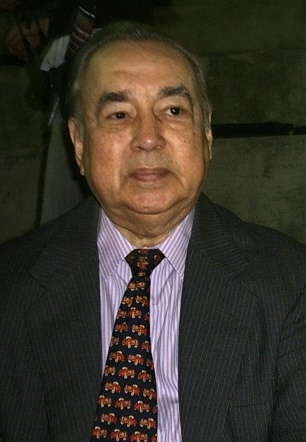
Venezuelan arranger, composer, conductor and pianist Aldemaro Romero (1928-2007). Photo © 2006 Guillermo Ramos Flamerich
Next, operatic bass-baritone Ryan Speedo Green, a Grammy winner and Met performer, joined Payare for three well-chosen arias from familiar operas by Gounod, Mozart and Rossini. Green has a powerful voice that seemed capable of projecting to the back of the amphitheater without electronic assistance. His expressive face, appearing in closeups on large crystal-clear screens at either side of the stage, displayed emotions from playful humor to violent intent as he sang. He and Payare seemed to have great rapport, Green indicating his readiness for the next aria with a slight shoulder movement or a subtle raised eyebrow that brought a smile to the Maestro's face. Green got a standing ovation after a touching interpretation of 'This nearly was mine', a surprise crossover hit for Met star Ezio Pinza when he appeared on Broadway in Rodgers and Hammerstein's South Pacific decades ago.
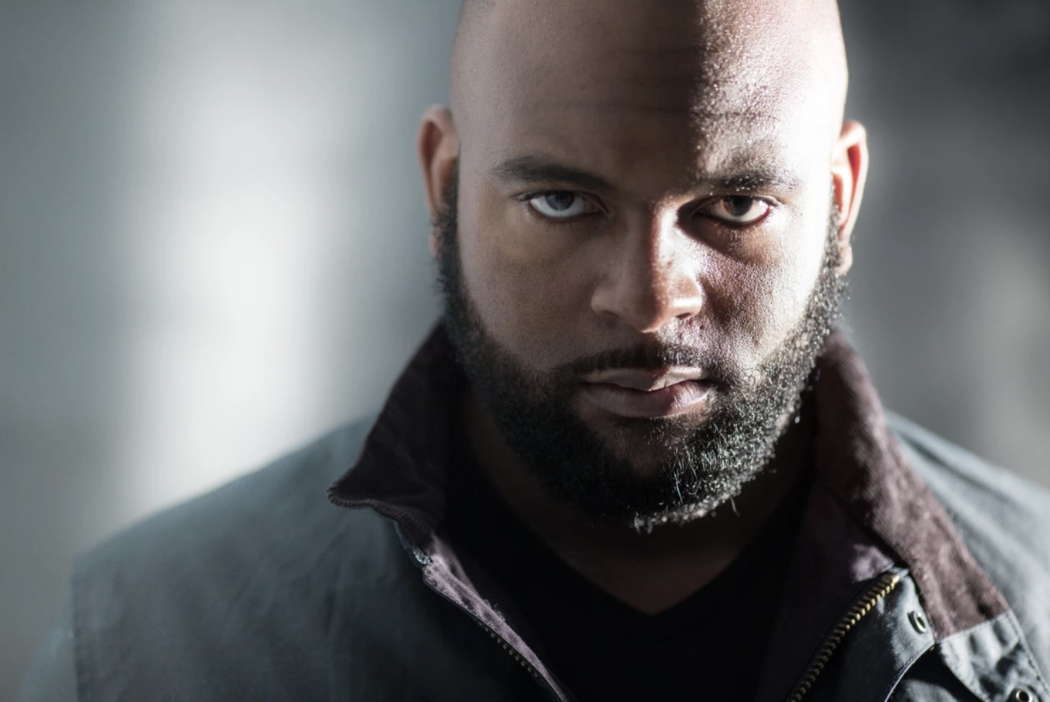
Ryan Speedo Green. Photo © Dario Acosta
The second half began with pianist Jean-Yves Thibaudet.
Clad in a glittering black jacket, he delivered an appropriately jazzy interpretation of Gershwin's Rhapsody in Blue. Thibaudet is a versatile pianist, well known for his swinging affinity for both the Rhapsody and Gershwin's piano concerto. On this evening he was at his bluesy best in slower passages and, if anything, displayed a bit too much technical brilliance while tearing through the cadenza's most difficult passages.
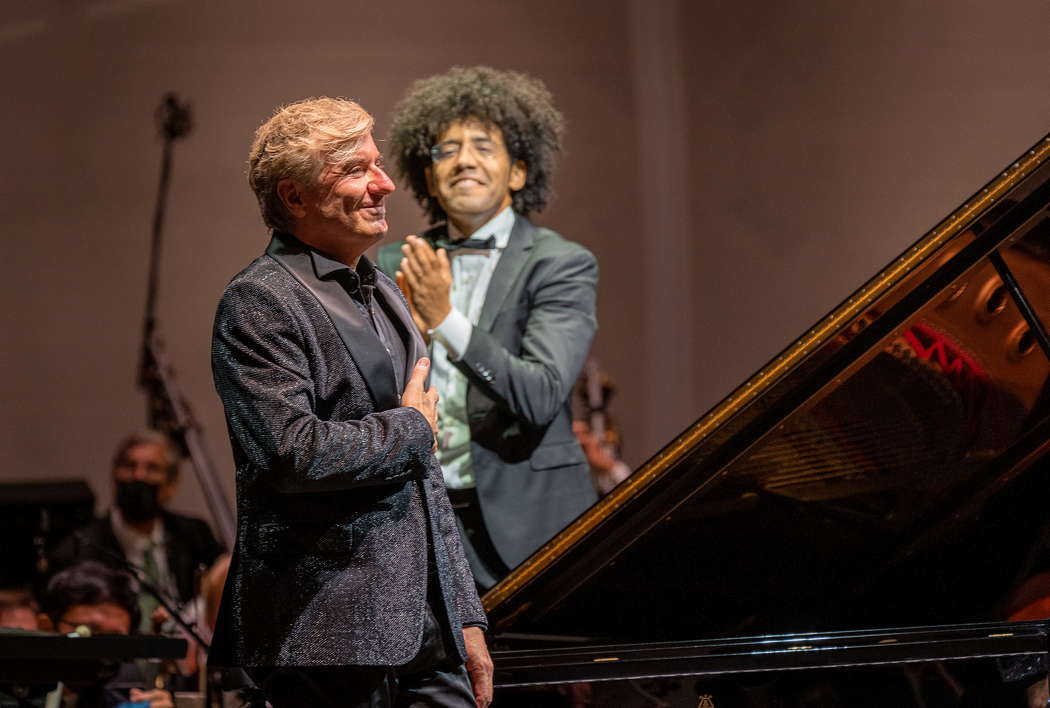
Jean-Yves Thibaudet and Rafael Payare at the San Diego Symphony concert. Photo © 2021 Gary Payne
The evening concluded with Stravinsky's Firebird Suite. Payare's interpretation demonstrated the full range of his orchestra's considerable capability and was also the final convincing argument that the Rady Shell is in some ways superior to the average concert hall. Quiet passages carried clearly throughout the performance space. There wasn't a trace of the muddiness or higher-pitched ringing sometimes heard in an average hall during louder tutti passages. Soloists emerged with clarity, and simultaneous section lines were each distinctly audible.
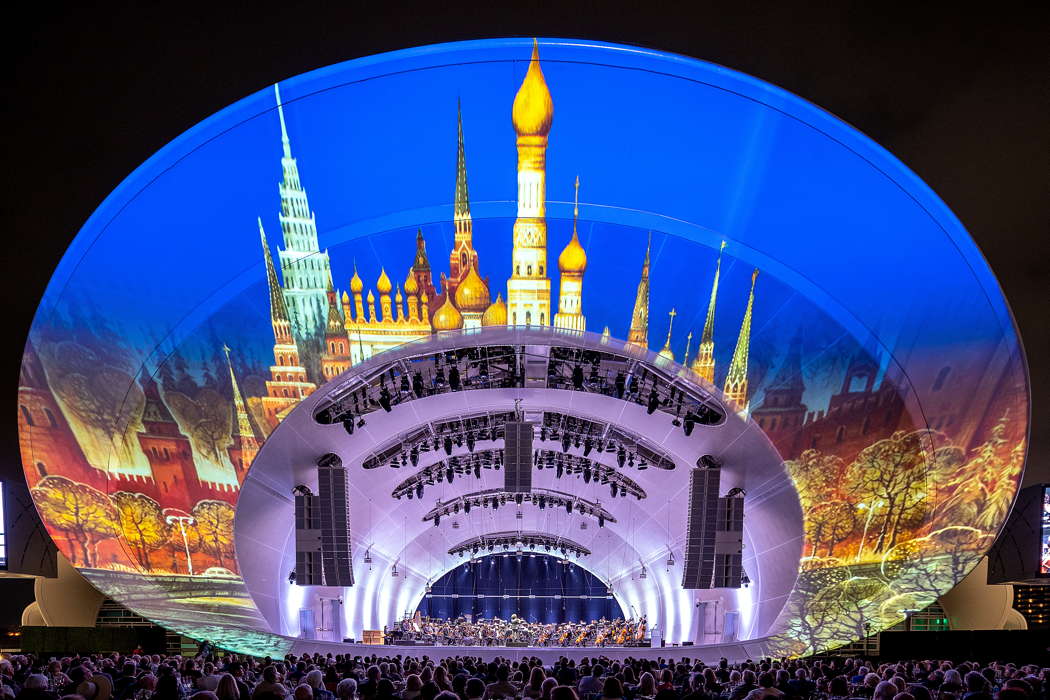
A scene from the reviewed San Diego Symphony concert. Photo © 2021 Gary Payne
Disadvantages? Surrounding extraneous sounds, though seldom distracting, are unavoidable. The placement of most of the tables for four in the front section allowed little space for aisles and rows. Parking can be a bit confusing, especially when the Padres have a home night-game. (But I may be thinking that because I searched the wrong level of the adjacent Convention Center garage when retrieving my car.)
Quibbles aside, the sound, and the visual impact of the amphitheater lying between San Diego's colorful skyline and a sun setting on the bay are stunning. The Rady Shell is a cause for civic pride, a must-see attraction for tourists, and a marvelous second home for the San Diego Symphony.
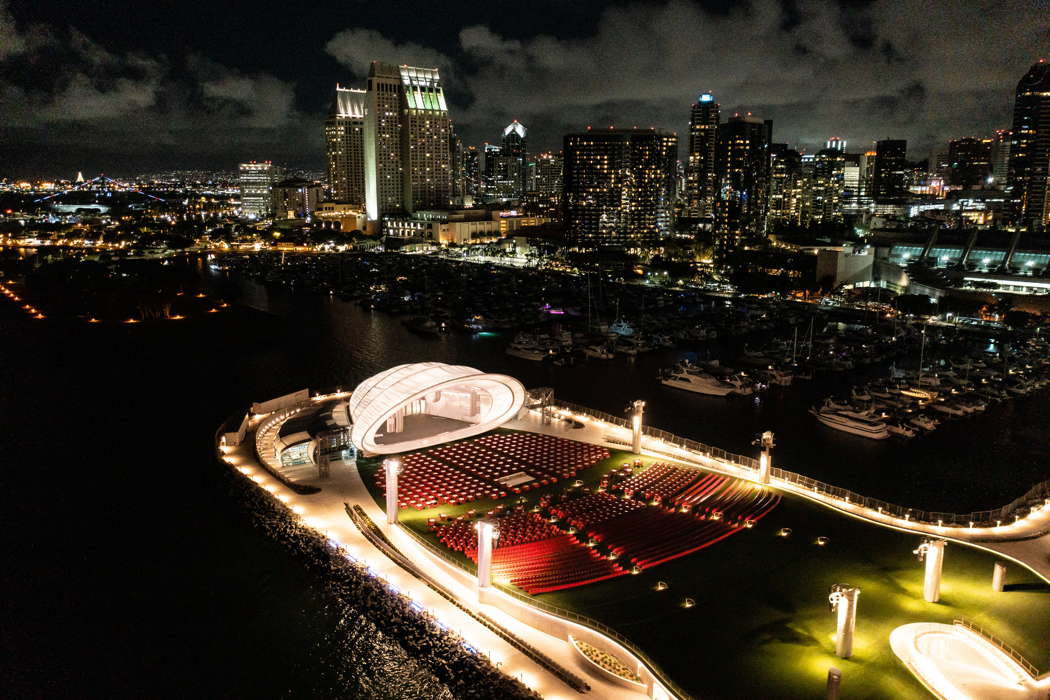
San Diego's Rady Shell in Spring 2021
Three-years in the making - thirty years in California real-estate development time - it is a spectacular success. Congratulations to CEO Gilmer, the Symphony board of directors, the Port of San Diego, the California Coastal Commission, city government, architect Greg Mueller, sound engineer Shawn Murphy, and far more than generous private donors. It really did 'take a village'.
Copyright © 18 August 2021
Ron Bierman,
San Diego, USA

MORE ARTICLES ABOUT CLASSICAL MUSIC IN SAN DIEGO
MORE ARTICLES ABOUT CAMILLE SAINT-SAËNS



